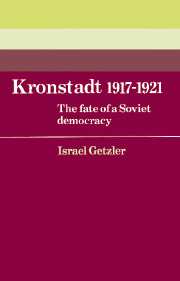Book contents
7 - Pride and glory of the Russian revolution?
Published online by Cambridge University Press: 29 September 2009
Summary
Power and democracy were the fundamental questions which bedevilled Russia in the 1917 revolution, as they have ever since. The Kronstadters' attempt to solve them produced a bustling, self-governing, egalitarian and highly politicized Soviet democracy, the like of which had not been seen in Europe since the days of the Paris Commune.
Yet, not surprisingly, in the debate on and struggle for power which convulsed the Russian revolution, it was the Kronstadt Soviet's power that caught universal attention, notably that of Trotsky, Tseretelli and Lenin. But it was symptomatic of the revolution's tragedy that Kronstadt's singular and innovating achievement of Soviet democracy went largely ignored.
The despatch with which the spontaneously elected Committee of the Movement put down the savage outburst of class hatred and revenge was truly impressive. More impressive still was the speed, prudence and skill with which its successor, the Soviet of Workers' and Soldiers' Deputies, channelled the Kronstadters' revolutionary energies and egalitarian aspirations into the creation of a vast network of base assemblies, committees and trade unions, and, with their backing, established itself as an effective local authority. The Soviet's success in filling both the power vacuum created by the collapse and elimination of the Viren regime, and the institutional and cultural wasteland which it inherited, is more than remarkable. For, apart from some philanthropic, military-sporting and cultural-religious organizations, including no less than five societies for the struggle against alcoholism, chaired by Viren himself, his wife, some grey official, retired officer or priest, there were no social, cultural or political clubs or trade unions to provide the creative setting for a local democratic intelligentsia in Kronstadt.
- Type
- Chapter
- Information
- Kronstadt 1917–1921The Fate of a Soviet Democracy, pp. 246 - 258Publisher: Cambridge University PressPrint publication year: 1983



